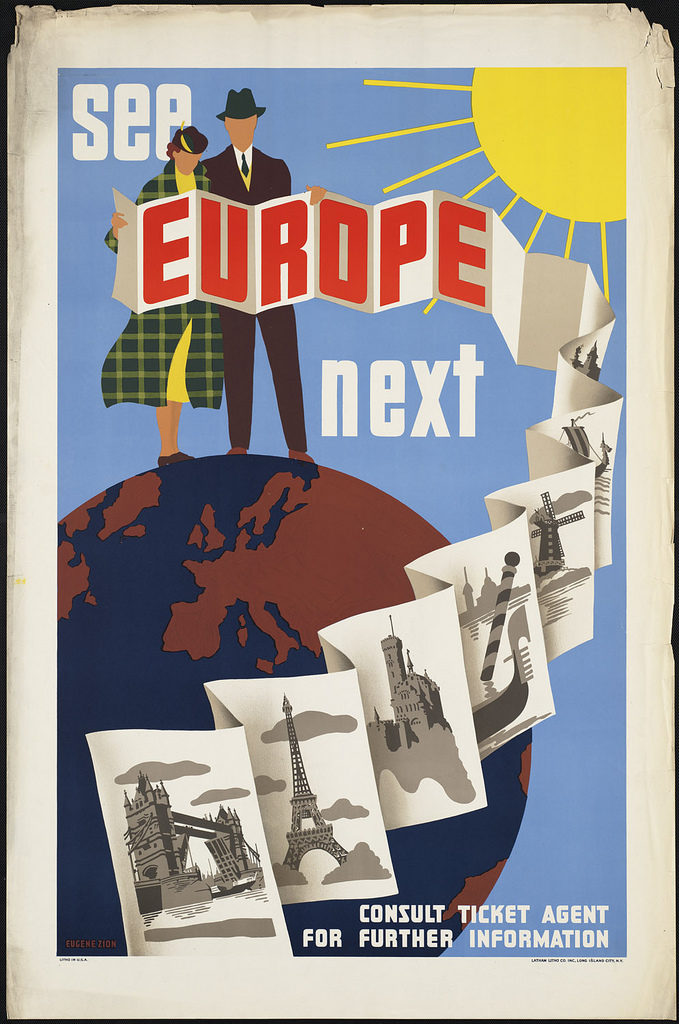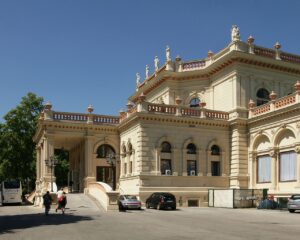If It’s Tuesday, This Must Be Belgium. So read the title of a zany, star-studded 1969 comedy that parodied a frantically paced European tour (18 days, 9 countries). I didn’t see the movie, but I remember thinking when it came out: “Gosh, any chance to tour Europe would be magnificent, no matter what the pace.” In fact, such an itinerary sounded ideal to me.
Fortunately, that kind of travel has fallen out of fashion. Routes today offer more immersive experiences. One popular concept invites guests to gain meaningful familiarity by spending “A Week in Krakow” or “A Month in Tuscany.” Other itineraries focus on special interests (culinary arts, music, military history). Fashionable, too, are river cruises, where guests arrive, unpack once, and then cruise to multiple destinations.
 Have you noticed, though, that advertisements for all of these kinds of tours are based on “the ideal”? They feature the most beautiful photos and ask us to imagine ourselves as one of those elegantly dressed people, unhurriedly engaged in the pursuit of fascinating activities, fulfilling lifelong dreams.
Have you noticed, though, that advertisements for all of these kinds of tours are based on “the ideal”? They feature the most beautiful photos and ask us to imagine ourselves as one of those elegantly dressed people, unhurriedly engaged in the pursuit of fascinating activities, fulfilling lifelong dreams.
Notice too that these idealized travelers usually appear largely alone, dining against the background of the perfect sunset, roaming unspoiled beaches, or gazing at gilded ceilings in hushed reverence.
The realities of travel, of course, are quite different. Tourists today are not elegantly dressed, unless at final farewell dinners and formal performances. And even then, almost anything goes. The halls of palaces are not hushed: massive crowds occupy almost every square inch of historically significant sites these days. An oversized group can push you right into the sconces in a palatial Halls of Mirrors! Days are long, meals can be strange, castle steps are twisty and even downright hazardous, and it rains every day you forget your umbrella.
River cruising—perhaps the most ideally depicted and, indeed, absolutely wonderful—frequently comes up against a problem referenced only in the fine print: the inability to sail due to water too low or too high. This problem can turn even the most luxurious river cruise into a makeshift bus tour.
Don’t get me wrong: the chance to travel, no matter how or where, is amazing. It is a privilege that, if you think about it, is enjoyed by a relatively small percentage of the world’s citizens. So whenever life presents the opportunity, I advise everyone to do it. But let us not forget that idealized travel is not the same as real travel.
My present tour has had some challenges. On Tuesday of this week, while we didn’t find ourselves in Belgium, we were disembarking our ship early in Budapest, to board a bus for Bratislava, Slovakia, and ultimately to Vienna. Why? We were making severe readjustments due to extremely low water. All summer, this condition has affected not only the European tourist industry, but commercial river traffic. Today, we’ll need to bus even further. But we’ll end the day’s long itinerary by “flipping ships” and boarding the sister vessel of our original ship, docked miles to the west in deeper water.
What will that mean to our group? Well, they will be looking to recapture the ideal, or at least the pursuit of the ideal images that led each of them to be here in the first place.

As with anything in life, though, breaking from an ideal plan can bring unexpected joys. Wednesday night provided a good example. We attended a concert in Vienna’s famous Kursalon Hübner, a gorgeous hall on the Ringstrasse constructed in the 1860s as a venue for the fashionable “taking of mineral waters” and pleasurable balls and concerts. Vienna’s Kursalon is particularly famous as the venue where Johann Strauss Jr. conducted his beloved waltzes, polkas, and operetta hits.
The grand chandeliers hanging above our heads reflected the light in many eyes as we relished the small but mighty orchestra pouring forth some of Mozart’s and Strauss’s greatest hits. After two days of rather tough busing and rearranging ourselves into hotels, it seemed to dawn simultaneously on all of us that we wouldn’t be in Vienna this evening, able to enjoy this concert, if we had had ideal sailing conditions.
Vigorously clapping out the traditional cadence to Johann Strauss Sr.’s Radetzky March, most in the group seemed to experience a washing away of fatigue and frustration. We left with uplifted spirits and a sense of joy.
Ideals do uplift us. They bring us joy. Cherishing such ideals throughout our daily, worldly activity is important. We are strengthened by them, even when we do not realize it.
But so much of what we pursue in our daily lives inevitably falls short of the ideal. Every time I move, I’m sure I will finally achieve the perfect kitchen cabinets featured in house-and-garden magazines. I’m still waiting.
Along those same lines, we’re looking forward to putting in a garden in our new North Carolina home. We have the perfect spot. Surely it will be ideal, right? But the realities of actual tilling, digging, weeding, and the vagaries of rainfall may not quite come together.
These are small examples. The biggest example of confronting the ideal, to me, comes with parenthood. When blessed with the opportunity to raise a child, the thoughts of many people go immediately to the image of parents gazing lovingly at an infant. This is the image we see in the congratulation cards and on the covers of child-care manuals. This, too, is the hope—the ideal each of us desires.
But as any parent knows, the ideal, no matter how strong or frequently realized (and it is), cannot be maintained every day. The realities of raising children stray far from the ideal. I can name small things, like the parade of diapers and the shrieking of toddlers. Or the repeated need to stand sternly over little ones as they retrieve pop beads, missing shoes, and food wrappers stashed under the couch. These are not good photo-ops.
But there are far more serious things that challenge us too. When dreaming about the ideals of parenthood, parents-to-be don’t immediately flash to the image of sitting anxiously by the hospital bed of a sick child (as one of my dear friends did recently across many days). Or the long hours of anxiety that are inevitable when a child enters the teen years.
Yet, who would want to replace the idealized images that inspire us in our biggest and smallest aspirations? To take my original example, who would want to fill travel brochures with pictures of tourists stranded at an airport after canceled flights (I just spent ten extra hours in Munich airport in just that situation). Or who wants to read accounts of lost luggage, banged knees, and tummy upsets due to changes in diet?
The ideal is what we want and need. The ideal is our best standard of measurement, at least as we set out on a task. We have, as humans, an astonishing ability to renew our faith in the ideal. We can shake off our failures, our difficulties, and start again. The smallest bit of joy can erase mountains of distress. Sometimes all it takes is a good night’s sleep. Or the eyes of a child who presents us a drawing with the words “I’m sorry mommy.”
So cherish your ideals, and remember that they are spiritual gifts. No matter what comes our way, no matter how we might flail around, or find ourselves stymied, our ideals inspire continuously renewed strength and are sources of inexhaustible inspiration.




But I love If It’s Tuesday, It Must Be Belgium! Really a perfect, funny, and wistful movie for that Grand Tour ideal, circa 1960s. But after watching you are forewarned against it. Thank you for this article expressing traveler’s dilemma. I thought I was the only one to not live up to the ideal.